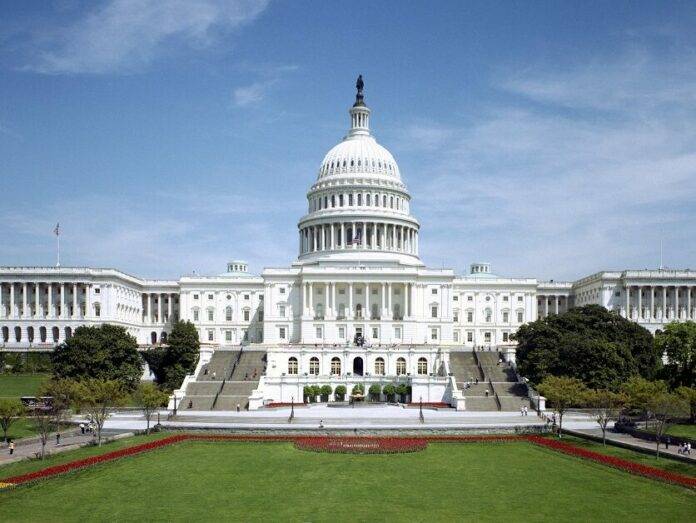Congressional Republicans are gearing up for a significant confrontation regarding the future of tax cuts and spending as both the Senate and House prepare to introduce competing fiscal year 2025 budget resolutions. These resolutions serve as foundational blueprints for the budget reconciliation bills that lawmakers will need to advance in order to implement the spending and tax priorities outlined by President Donald Trump.
Currently, there is a noticeable divide between the House and Senate GOP regarding the content and structure of the reconciliation bills, with disagreements on whether a single comprehensive bill or multiple bills would be more effective. The Senate is anticipated to engage in discussions this week regarding a fiscal 2025 resolution that is considerably more restrained than the House’s proposal. This Senate resolution aims to boost funding for defense and border security, while simultaneously projecting an increase in deficits by approximately $515 billion, as reported by the Bipartisan Policy Center.
Despite assertions from Senate Budget Chairman Lindsey Graham that the new spending will be offset, the current resolution mandates only minimal cuts. Notably, the Agriculture Committee is expected to identify $1 billion in cuts over the next decade. Furthermore, the Senate resolution does not propose new tax cuts or an extension of the expiring provisions of the 2017 Tax Cuts and Jobs Act. Senate Republicans are opting to reserve these substantial issues for a potential second reconciliation bill.
The Senate Budget Committee endorsed the resolution last week with a narrow party-line vote of 11-10. In contrast, the House GOP remains committed to passing one extensive reconciliation bill. The budget resolution that the House may consider during the week of February 24, following its current recess, could facilitate tax cuts totaling up to $4.5 trillion while imposing spending cuts of at least $1.5 trillion. An amendment pushed by the House Freedom Caucus stipulates that tax cuts would be capped at $4 trillion unless spending reductions reach $2 trillion.
Under the House resolution, the Agriculture Committee is directed to implement spending cuts of at least $230 billion, which would necessitate reductions in existing Supplemental Nutrition Assistance Program (SNAP) benefits, according to Chairman Glenn “GT” Thompson (R-Pa.). Additionally, the House budget resolution is likely to mandate considerable cuts to Medicaid, the health care program that supports low-income individuals and is vital for rural health care providers. Some hardline conservatives are advocating for the elimination of tax incentives for the biofuel industry established by the Inflation Reduction Act, though these repeal efforts face pushback from Midwest House Republicans and GOP senators.
Senator Joni Ernst (R-Iowa) reaffirmed the administration’s commitment to biofuels, indicating a strong bipartisan interest in maintaining support for this sector. Senator John Hoeven (R-N.D.) acknowledged that while some clean energy sources, such as wind, are sufficiently developed to no longer require tax credits, incentives for carbon capture technologies, like those outlined in the 45Q tax credit, as well as for biofuels (45Z), are likely to persist. He emphasized the ongoing need for innovation and development in these areas and noted significant backing from both Republicans and the president for biofuels and carbon capture initiatives.
Hoeven also suggested that the budget resolution’s directive for the Senate Agriculture Committee to cut at least $1 billion may merely serve as a preliminary figure and that the final amount could differ significantly based on discussions with House leadership. He expressed a willingness to evaluate the House’s approach and engage with Thompson’s insights on the matter.
Ultimately, a consensus on the fiscal year 2025 budget resolution will need to be reached between the House and Senate, which will determine whether one or two reconciliation bills will be pursued and establish the parameters for spending and tax reductions within the resultant legislation. Thompson has indicated that he anticipates the SNAP cuts mandated by the House resolution to be less severe than initially proposed.
Given the current political landscape, it is highly probable that Republicans will need to pass the budget resolution without any Democratic support. Senator Amy Klobuchar (D-Minn.) articulated concerns regarding the GOP’s tax cut plans during a recent interview, stating, “They have decided they want to find $2 trillion for their tax cuts for the wealthiest. And we’re fine with tax cuts for people making under $400,000 a year, but we’re talking about the wealthiest of the wealthiest and their buddies, Elon Musk. So they’re looking for that money anywhere they can find it, whether it’s on the backs of rural America, whether it’s on the backs of veterans, whether it is on the backs of cancer research.”
In the meantime, Agriculture Secretary Brooke Rollins has quickly embarked on her role following her swearing-in last week. She made her first public appearance at the National Farm Machinery Show in Louisville, Kentucky, and is scheduled for a roundtable discussion in Plains, Kansas, with GOP Senators Roger Marshall and Jerry Moran, along with Representative Tracey Mann (R-Kan.).
As the fiscal landscape continues to evolve, a series of agriculture- and rural-related events are slated for the upcoming week in Washington and beyond, including a WTO Trade Dialogue on food and hearings in the Senate on environmental review processes and labor secretary nominations. For ongoing updates, stakeholders are encouraged to monitor developments at Agri-Pulse.com.




